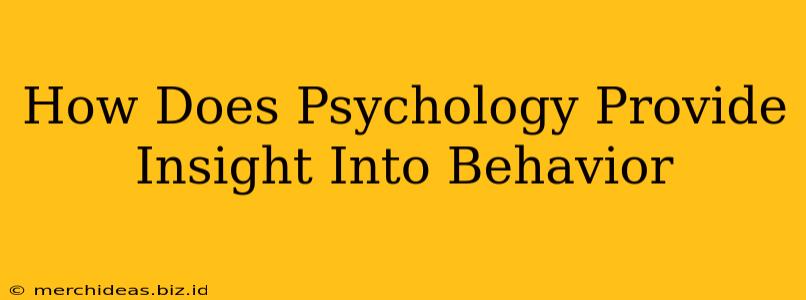Psychology is the scientific study of the mind and behavior. It offers invaluable insights into why we think, feel, and act the way we do, impacting various aspects of our lives from personal relationships to societal structures. Understanding the core principles of psychology is crucial for navigating the complexities of human interaction and personal growth.
Understanding the Multifaceted Nature of Behavior
Human behavior is incredibly complex, shaped by a multitude of interacting factors. Psychology doesn't offer simple answers, but rather a framework for understanding these complexities. It considers a wide range of influences, including:
Biological Factors:
- Genetics: Our inherited traits significantly influence temperament, predispositions to certain mental illnesses, and even personality aspects. Psychology explores the interplay between genes and environment in shaping behavior.
- Neurology: The structure and function of the brain directly impact our thoughts, emotions, and actions. Neuropsychological studies illuminate the brain regions associated with specific behaviors and cognitive processes.
- Hormones: Hormonal fluctuations throughout life affect mood, energy levels, and social interactions. Understanding the hormonal basis of behavior helps explain variations in behavior across different life stages and genders.
Psychological Factors:
- Cognitive Processes: Our thoughts, perceptions, memories, and problem-solving abilities all shape our actions. Cognitive psychology investigates how these mental processes influence behavior, offering insights into decision-making, learning, and biases.
- Emotions: Emotions profoundly impact behavior, driving us towards certain actions and away from others. Emotional psychology explores the role of emotions in motivation, relationships, and mental health.
- Personality: Individual differences in personality traits significantly influence how people react to situations and interact with others. Personality psychology examines the structure of personality and how it relates to behavior.
Environmental Factors:
- Social Influences: Our social interactions, cultural norms, and societal expectations powerfully shape our behavior. Social psychology examines how group dynamics, social pressures, and cultural context influence individual actions.
- Learning: Our experiences throughout life teach us how to behave. Learning theories, such as classical and operant conditioning, explain how we acquire new behaviors and habits.
- Cultural Context: Culture profoundly impacts behavior, influencing values, beliefs, and accepted social norms. Cross-cultural psychology investigates how cultural differences shape behavior and mental processes.
The Diverse Branches of Psychology and Their Contributions
Psychology's scope is vast, encompassing numerous specialized fields that offer unique perspectives on behavior:
- Clinical Psychology: Focuses on the diagnosis, treatment, and prevention of mental disorders. It provides crucial insight into maladaptive behaviors and strategies for improvement.
- Developmental Psychology: Studies how behavior changes across the lifespan, from infancy to old age. It offers valuable understanding of milestones, challenges, and changes in behavior during various life stages.
- Educational Psychology: Examines how learning occurs and how to optimize the learning environment. This branch provides insights into effective teaching strategies and learning styles.
- Forensic Psychology: Applies psychological principles to legal settings, assisting in areas like criminal profiling, eyewitness testimony, and jury selection.
- Industrial-Organizational Psychology: Focuses on workplace behavior, examining issues such as employee motivation, team dynamics, and organizational effectiveness.
Conclusion: Psychology – A Key to Understanding Behavior
Psychology offers a multifaceted and powerful lens through which to understand human behavior. By considering biological, psychological, and environmental factors, psychologists gain crucial insights into the complexities of human actions and motivations. This understanding is not only academically enriching but also practically valuable, informing interventions in various fields aimed at improving individual well-being and societal functioning. From improving mental health to optimizing learning and work environments, the applications of psychological insights are vast and continue to evolve.
